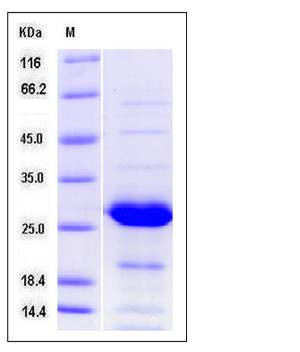Human PSPH Protein
PSP,PSPHD
- 100ug (NPP4196) Please inquiry
| Catalog Number | P13503-HNAE |
|---|---|
| Organism Species | Human |
| Host | E. coli |
| Synonyms | PSP,PSPHD |
| Molecular Weight | The recombinant human PSPH consists of 225 amino acids and has a calculated molecular mass of 25KD. It migrates as an approximately 28KDa band in SDS-PAGE under reducing conditions. |
| predicted N | Met 1 |
| SDS-PAGE |  |
| Purity | > 84 % as determined by SDS-PAGE |
| Protein Construction | A DNA sequence encoding the human PSPH (P78330) (Met 1-Glu 225) was expressed and purified. |
| Bio-activity | |
| Research Area | Cancer |Signal transduction |Metabolism |Types of disease |Metabolism in Cancer |
| Formulation | Lyophilized from sterile PBS, pH 7.5 1. Normally 5 % - 8 % trehalose and mannitol are added as protectants before lyophilization. Specific concentrations are included in the hardcopy of COA. |
| Background | Phosphoserine phosphatase (PSPH) belongs to a subfamily of the phosphotransferases. PSPH is the rate-limiting enzyme in l-serine biosynthesis. It has previously been found that Phosphoserine phosphatase (PSPH) plays a role in epidermal homeostasis. Phosphoserine phosphatase (PSP) catalyzes the hydrolysis of phosphoserine to serine. Phosphoserine phosphatase (PSPH) expression has been examined in human-mouse somatic cell hybrids retaining different combination of human chromosomes. Phosphoserine phosphatase (PSPH) is expressed throughout the proliferative layer of the epidermis and hair follicles in rodent and human skin and is highly induced in SCC. In keratinocytes, Phosphoserine phosphatase (PSPH) is a cytoplasmic protein that primarily localizes to endosomes and is present primarily as a homodimer. Knock down of Phosphoserine phosphatase (PSPH) dramatically diminished SCC cell proliferation and cyclin D1 levels in the presence of exogenous of l-serine production suggesting a non-canonical role for Phosphoserine phosphatase (PSPH) in epithelial carcinogenesis. Phosphoserine phosphatase (PSPH) is highly induced in proliferative normal keratinocytes and in skin tumors. Phosphoserine phosphatase (PSPH) appears to be critical for the proliferation of SCC cells; however, this phenomenon may not involve the phosphoserine metabolic pathway. |
| Reference |
